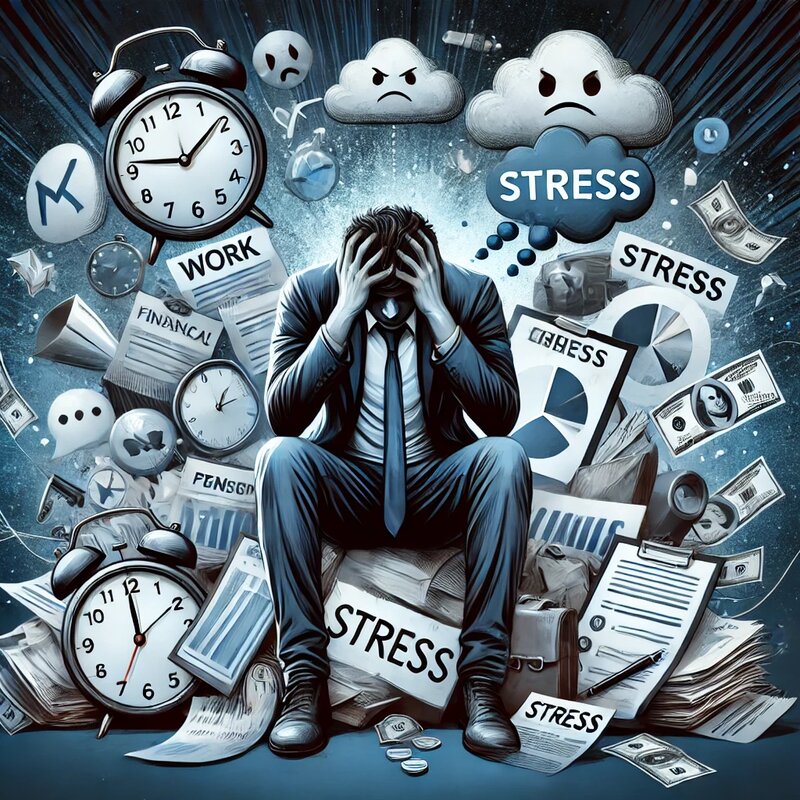Understanding Stress and Conflict: A Complete Psychological Guide for Better Mental Health
Comprehensive guide to understanding stress, conflict theory, and psychological reactions. Learn effective stress management techniques and how to improve your mental health with expert psychological insights.
Stress
- Stress is a multi-faceted process.
- It involves the evaluation of a situation and the response given to it.
- Normally, it is believed that stress arises due to negative events or stressful circumstances. However, in reality, it can also result from positive events.
Example:
Winning a competition, getting a promotion, or receiving a reward can also cause stress. That is, even positive events can lead to stress.
Hans Selye’s Stress Theory
Physiologist Hans Selye categorized stress into two types:
- Positive Stress (Eustress)
- Negative Stress (Distress)
Definition of Stress
- Stress is a multi-faceted process.
- Stressful events or situations generate tension (mental strain).
- It depends on whether the situation is within a person’s control. If a person cannot control a situation, stress is generated.
- Stress can be psychological or physiological.
- Due to stress, a person may experience mental and physical disturbances.
- Stress is neither always harmful nor always beneficial. It depends on the surrounding circumstances.
It is believed that stress is an assessment of a situation or event and the response given to it. It depends on a person’s mental and physical capacity.
Reactions to Stress
1. Psychological Reactions
- Cognitive Impairment
- Emotional Responses
- Anxiety
- Anger and Aggression
- Empathy and Depression
2. Physiological Reactions
- Emergency Response
- General Adaptation Syndrome (GAS)
- Stage of Alarm Reaction
- Stage of Resistance
- Stage of Exhaustion
Cognitive Impairment
Cognitive impairment refers to difficulties in concentration and attention. A person under stress starts thinking in a reactionary manner, reducing their ability to assess situations correctly.
- Shortened attention span
- Memory loss
- Rigid thinking patterns
Specific Emotional Responses (Negative)
1. Anxiety
Anxiety is an unpleasant emotional state caused by stress. There are two types of anxiety:
- Normal Anxiety: Adaptive and helps a person adjust to stress.
- Neurotic Anxiety: When stress develops in almost every situation, leading to helplessness and fear.
2. Anger and Aggression
When an individual experiences obstruction in achieving a goal, frustration occurs, leading to aggressive behavior.
- Higher anger levels result in greater aggression.
- Frustration displacement: When a goal seems unattainable, anger may be directed toward weaker targets.
3. Empathy and Depression
- A lack of empathy may lead to learned helplessness, where the person feels powerless.
- Martin Seligman’s research explains how learned helplessness contributes to depression.
Physiological Reactions to Stress
Stressful situations cause physiological responses such as:
- Stomach discomfort
- Increased heart rate
- Excessive sweating
- Changes in blood pressure
Emergency Response
- The body engages in emergency reactions to prepare for a stressful situation.
- Energy levels increase to handle mental stress.
Categories of Stressors
1. Stressful Life Events
Life events bring different kinds of changes, requiring individuals to re-adjust. If a person cannot cope, stress may lead to emotional disorders.
Holmes & Rahe Stress Scale (1967)
Psychologists Holmes & Rahe developed the Social Readjustment Rating Scale (SRRS) to rank life events based on their stress impact:
- Death of a spouse
- Divorce
- Imprisonment
- Personal injury or illness
- Marriage
- Job loss
Conflict of Motives
When a person is torn between two motives, they experience psychological distress.
Some psychological conflicts contributing to stress include:
- Independence vs. Dependence
- Intimacy vs. Isolation
- Impulsive Expression vs. Moral Standards
Kurt Lewin’s Conflict Theory
In 1930, Kurt Lewin categorized conflict as a struggle between opposing tendencies or instincts.
Two Main Types of Response:
- Approach (Desirable alternatives)
- Avoidance (Undesirable alternatives)
Three Types of Conflict:
- Approach-Approach Conflict: Choosing between two desirable options.
- Example: Selecting between two exciting job offers.
- Avoidance-Avoidance Conflict: Choosing between two undesirable options.
- Example: Deciding between paying a hefty fine or attending a mandatory workshop.
- Approach-Avoidance Conflict: A single choice has both desirable and undesirable aspects.
- Example: A high-paying job requiring relocation to an unfamiliar city.
This theory helps explain how individuals navigate decision-making under stress.
Daily Hassles
Daily hassles refer to small, everyday problems that contribute to stress. Although minor individually, their cumulative impact can significantly affect well-being.
Categories of Daily Hassles:
- Environmental Hassles: Pollution, noise, crime, overcrowding, and traffic.
- Inner Concern Hassles: Worries about health, future, relationships, or financial security.
- Lack of Time: Overwhelming schedules and deadlines.
- Financial Responsibilities: Struggles with debt, savings, or security.
- Work Hassles: Job-related stress, job insecurity, and excessive work pressure.
Work-Related Stress
Factors Leading to Work Stress:
- Workload Imbalance: Excessive work in a limited timeframe or underutilization.
- Uncomfortable Work Environment: Poor lighting, bad air quality, excessive noise.
- Job Insecurity: Fear of layoffs or lack of career growth.
Burnout
When stress accumulates over time, it can lead to burnout—a state of emotional, physical, and mental exhaustion.
Symptoms of Burnout:
- Depression and frustration
- Disconnection from work
- Reduced efficiency
- Increased irritability
At its extreme, burnout leaves a person feeling completely drained and unable to function effectively.
Conclusion
Stress is a complex phenomenon that affects individuals physically, emotionally, and psychologically. While some stress can be motivating (Eustress), excessive stress can lead to mental and physical health issues (Distress).
Understanding conflict theories, recognizing daily stressors, and managing work-related stress can help individuals navigate challenges more effectively.
